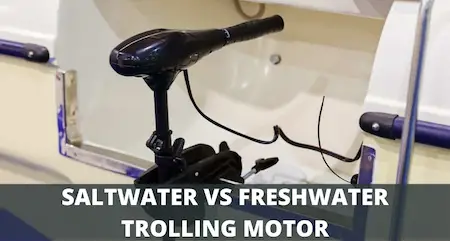Saltwater Trolling Motor Vs Freshwater Trolling Motor (Here’s What You Need To Know)
UPDATED 17 MAY 2023
Are you a freshwater angler thinking about using your boat and trolling motor for saltwater fishing?
In that case you’re probably wondering if you can safely use your freshwater trolling motor in the ocean, or if this will cause irreparable damage to it.
In this article we’ll walk you through the differences between saltwater and freshwater trolling motors, and what you need to do if you want to use a freshwater trolling motor in saltwater.

What’s the difference between a freshwater and saltwater trolling motor?
While a saltwater trolling motor has a similar build to a freshwater model, it comes with the following additional features to make it more resistant to saltwater corrosion:
- Fully sealed electrical components
- Stainless steel components
- Corrosion-resistant surface coating
Needless to say, these extra features also make saltwater trolling motors more expensive than freshwater models.
For example, on average, Minn Kota saltwater trolling motors are $200 to $400 more expensive than their freshwater counterparts (with otherwise similar specs and features).
However, if you’ve done any saltwater fishing, you’ll know just how corrosive saltwater exposure can be to metal and electronic components, which makes the additional cost of a saltwater trolling motor well worth it, especially if you plan to use it regularly in the ocean.
Can you use a freshwater trolling motor in saltwater?
Yes, you can definitely use a freshwater trolling motor in saltwater, but need to keep the following things in mind:
First of all, many manufacturers (including Minn Kota and Powerguide) won’t honor their warranty for a freshwater trolling motor that’s been used in saltwater.
So if you really want to keep the benefits of your warranty, it’s better not to do this.
Secondly, you should always make sure to rinse your trolling motor with freshwater immediately after it has been exposed to saltwater, and definitely shouldn’t keep it in saltwater any longer than necessary.
So don’t moor the boat with the trolling motor still in the water, since doing so speeds up corrosion exponentially.
Finally, if you plan to do a lot of saltwater fishing, it’s probably better to get a model that’s specifically designed for saltwater use.
But if you’re only going to do this a few times per year, then it’s perfectly fine to use a freshwater trolling motor and rinse it afterwards. You can also coat the metal parts with grease or anti-corrosion substances like WD-40.
What happens if you use a freshwater trolling motor in saltwater?
Saltwater is much more corrosive to metal surfaces than freshwater, so when you use a freshwater model in saltwater, this will dramatically speed up corrosion of all metal parts.
In addition to this, if saltwater gets inside the trolling motor, it can cause damage to the electronic connections, and salt crystals can form on internal mechanical components, which over time blocks their ability to function.
Will saltwater ruin a freshwater trolling motor?
Frequent exposure to saltwater can definitely ruin a freshwater trolling motor, by corroding its metal parts and electronic components, ultimately shortening its lifespan and leading to malfunction.
With that being said, it’s possible to avoid this (or at least slow it down significantly) by protecting it with anti-corrosion grease, plus rinsing and wiping it with fresh water after every use in saltwater.
So if you only use your freshwater trolling motor in saltwater occasionally, and rinse it properly afterwards, you can rest assured that saltwater won’t ruin it. I have friends who do this several times every year, and don’t have any problems with their freshwater trolling motor afterwards.
How long will a freshwater trolling motor last in saltwater?
If taken care of properly, a freshwater trolling motor can last for several years in saltwater.
However, this requires a lot of effort protecting and maintaining it, including regular use of protective coating to protect metal surfaces from corrosion, as well as rinsing it with freshwater after every use.
But even if you do all of this, keep in mind that your trolling motor won’t last as long as it would if only used in freshwater.
In my experience, sooner or later, exposure to saltwater compromises the rubber sealing of a freshwater motor, and you’ll end up with saltwater seeping inside, which will short out the electrical circuits.
How to protect a trolling motor from saltwater corrosion
A great way to protect a trolling motor from saltwater corrosion is by covering all exposed metal parts with marine grease, WD40, or anti-corrosion spray. Ideally, you’ll want to cover all surfaces generously with this every time before you use it in saltwater.
In addition to metal parts of the trolling motor, you can also use the protective coating on the batteries, cables, and terminals, as well as the trolling motor mounting bracket. If you have time, also do this with the propeller, prop pin and nut, as well as the shaft.
Incidentally, you should do this not only with the type of trolling motor built for freshwater, but also with a saltwater model, since the protective coating that it comes with from the plant will wear off after a while.
While doing this might seem a little tedious, it’s actually very easy if you use a spray, and it’s well worth the effort in terms of extending the lifespan of your motor.
How do you clean a trolling motor after saltwater exposure?
The best way to clean a trolling motor after saltwater exposure is to spray and rinse it with freshwater as soon as possible after you pull it out of the saltwater. It’s best to do this on the same day, since waiting just one day can speed up the corrosion process.
If you do this at home, it’s great to use the garden hose, but don’t direct that at the plastic cover of the head compartment, since that usually isn’t very watertight.
If you don’t want to wait until you get home, you can also use a spray bottle. I keep a spray bottle for this purpose in my car, and use it to rinse both the motor and my fishing reels after a fishing trip on the ocean.
Can you use a saltwater trolling motor in freshwater?
Yes, you can use a saltwater trolling motor in freshwater without any concerns.
In fact, it will last longer in this environment than it would in saltwater, as even a saltwater motor suffers from regular exposure to the ocean.
Why are saltwater trolling motors white?
Minn Kota saltwater trolling motors are white, in contrast to their freshwater models, which are black.
In addition to this color difference, they also refer to all their saltwater trolling motors as ‘Riptide’ models, which helps to distinguish easily between their freshwater and saltwater models.
However, this color convention only applies to Minn Kota motors, and not other trolling motor brands.
For example, you can get Rhodan or Haswing saltwater trolling motors that are either white or black, with the only difference between them being an aesthetic one.
If you’re currently looking for a new trolling motor, check out our article on what’s the difference between a 12v and 24v trolling motor?
